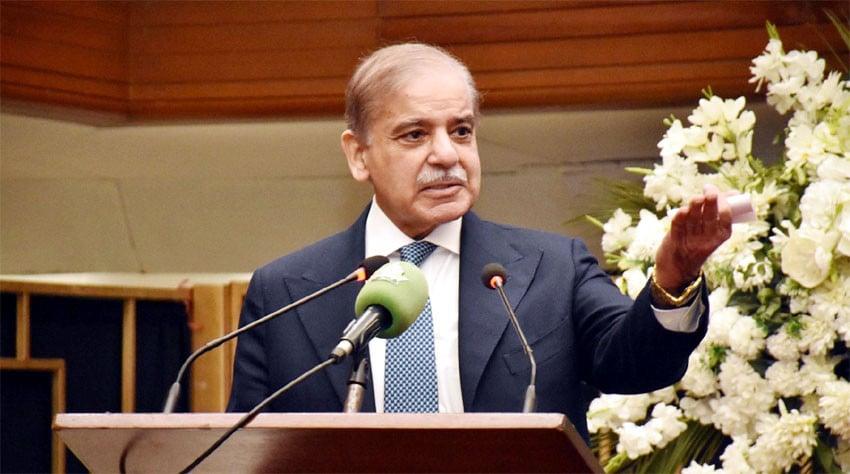Prime Minister Shehbaz Sharif said Wednesday that peace conversations between Pakistan and India could take place in Saudi Arabia or the United Arab Emirates (EAU), with the United States acting as a key mediator.
Speaking to journalists in Islamabad, the prime minister firmly declared that Pakistan had not requested a stop the fire during the recent conflict. “If we had done it, the international community would have known,” he said.
In addition, he said that an agreement was reached during communications between the General Directors of Military Operations (DGMO) of both countries that their respective forces would return to the positions of before the war.
The Prime Minister confirmed that the Pakistan delegation in the conversations would include the National Security Advisor and the Director General of Intelligence between Services (ISI).
Remembering the fighting in Pasrur, the prime minister said that the Pakistani forces remained firm despite the strong losses.
“Our soldiers remained firm and did not retire, even when a soldier and eight civilians were martyred at the control point. They fought to the last man and did not leave his post.”
When asked if Israeli staff were present in India during the conflict, Shehbaz Sharif said: “There are reports that suggest that the Israelis were in India. Israel provided broad support to India during the war, but despite that, we left victorious.”
“The Army Chief directed the war on behalf of all the Armed Forces. We pray and fight, and won,” he added.
Prime Minister Shehbaz reported a night phone call from the Army Chief Warning of Impending Indian Aggression. “At 2:30 am, he called me with anger, saying that India was preparing to attack. I said: we have no problem, respond and advance.”
He added: “We gave a powerful response to a country five times our size in economic and defense capacity. India saw itself as the region’s police officer: we destroy that arrogance. We fight only to defend our homeland, seeking only the pleasure of God.”
The prime minister said he had publicly offered an investigation into Pahalgam’s attack during a speech at Kakul Military Academy, stating that Pakistan had no participation. “The world accepted our position and our neutral offer.”
He said that India initiated the conflict, and in response, Pakistan destroyed six Indian airplanes, the demolished drones and even addressed the S-400 Air Defense System of India. “We could have demolished more airplanes but exert a moderation.”
Prime Minister Shehbaz Sharif said that Pakistan had made all the use of Chinese technology during the recent conflict and joked that the country had become a “marketing nation for China” worldwide.
He also praised China for being firmly with Pakistan and recognized the strong support received from Turkiye, Saudi Arabia, the EAU and Azerbaijan.
Answering a question about why the members of the opposition party Pakistan Tehreek-E-Insaf (PTI) were not included in foreign delegations, Shehbaz said: “These delegations are missions at the government level. After the comments made by some PTI figures in Indian television channels, can we run that risk?”
Pakistan-India Standoff
The last climb between Pakistan and India began on April 22, when an attack in the city of Pahalgam of Iiojk Resort killed 26 people. India immediately blamed Pakistan for the incident, despite not providing public evidence.
In response, India carried out a series of hostile actions the next day of April 23, including the suspension of the 65-year-old Indus Water Treaty (IWT), canceling the visas for Pakistani citizens, closing the border crossing of Wagah-Attari, ordering the closure of Pakistan’s high commission in New Delhi, and reduction of the diplomatic staff of the crosses.
Pakistan strongly rejected the accusation, qualifying it without foundation, but took reciprocal measures through its National Security Committee (NSC). These included stopping the trade with India, closing the Pakistani airspace to the Indian aircraft and other contracts.
Tensions intensified even more in the early hours of May 7, when missile attacks hit six cities in Punjab and Azad Jammu and Kashmir (AJK), destroying a mosque and killing dozens of civilians, including women, children and elders.
In a rapid military response, Pakistan’s armed forces knocked down the Indian combat planes, including three Rafale aircraft, widely considered as a key asset of the Indian Air Force. During the next two days, India launched waves of Israeli manufacturing drones, which were also neutralized by the Pakistan army.
The confrontation intensified again in the early hours of May 10, when India attacked several Pakistani air bases with missile attacks. In retaliation, Pakistan launched the Bunyanum Marsoos operation, damaging Indian military facilities, including missile storage sites, air bases and other strategic objectives.
For Saturday night, the president of the United States, Donald Trump, announced that the fire had been reached after intense diplomatic efforts during the night. Minutes later, the agreement was confirmed separately by the Minister of Foreign Affairs of Pakistan, Ishaq Dar, and the Secretary of Foreign Affairs of India.
But despite the high military fire, the war of narratives has fought.
While Pakistan publicly accredited the president of the United States, Donald Trump, together with China and the Gulf states, for playing a vital role in the disable of tensions, India minimized foreign participation. Indian officials have insisted that the truce was the result of direct bilateral conversations.
However, Trump has reiterated his position twice after the initial announcement.




